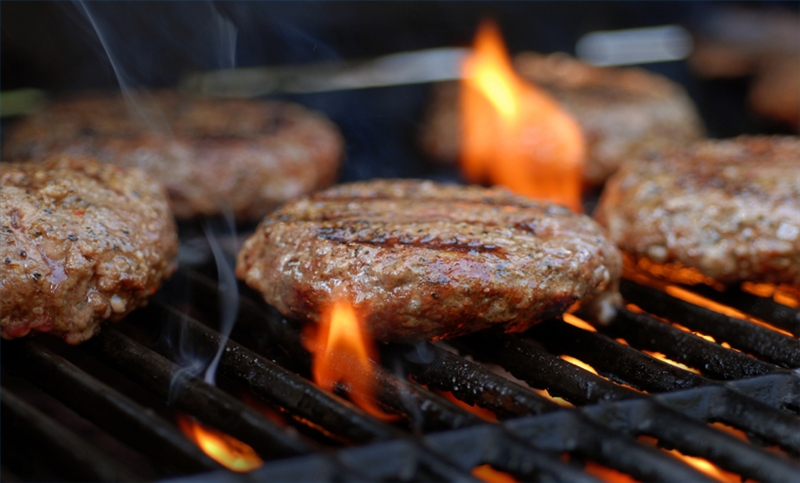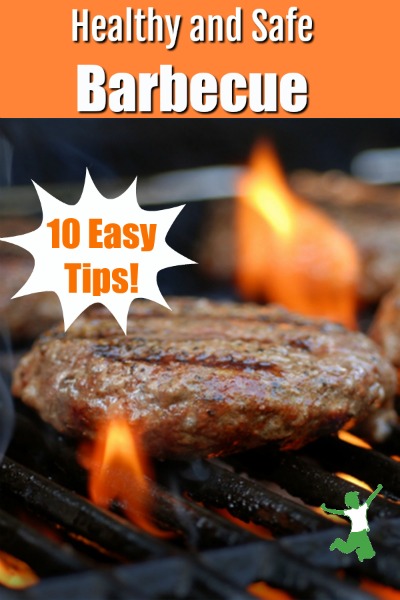Table of Contents[Hide][Show]
Tips for healthy barbecuing whether on a charcoal or gas grill and what to always serve on the side as extra protection to enjoy this traditional way of cooking without a serving of carcinogens.
Hamburgers and grilling are perhaps two of America’s more enduring traditions and the barbecue season is now in full swing. A question asked by S. Paine on Facebook echoes concerns about grilling out as commonly voiced on social media:
I am all for eating beef but I read that barbecue method of cooking is bad. Supposedly, it forms carcinogenic compounds called heterocyclic amines (HCAs) and also components called polycyclic aromatic hydrocarbons (PAHs). It’s said that cooking meat in the oven is much less harmful. Is it true or not? What’s your take on barbecue grilling as a cooking method?
Great question! Here’s some food for thought on the subject. In an article titled, Is there any safe way to grill foods? Judy Foreman writes:
The problem with grilling any kind of protein – red meat, poultry, fish – is that the process causes formation of two cancer-causing agents: HCAs, or heterocyclic amines, and PAHs, polycyclic aromatic hydrocarbons, said Karen Collins, nutrition adviser to the American Institute for Cancer Research. Laboratory data show these substances trigger the cancer process, and while data in humans are limited, there is suggestive evidence that they can also trigger cancer in people. (1)
Foreman points out that grilling vegetables produces no HCAs or PAHs, nor does grilling fruit.
Sally Fallon Morell addresses the topic of barbecue in several places in her book Nourishing Traditions. (2)
P. 355: Always buy “regular” full-fat ground meat but avoid cooking hamburgers and sausage on the barbecue, where flames can come in contact with the fat and form cancer-causing substances. Cook hamburgers and similar meats in a heavy, cast-iron skillet to minimize carcinogen formation in the final product.
p. 32: Research indicates that meats cooked at very high temperatures contain elevated amounts of carcinogens. (3) Meat should be eaten raw, rare or braised in water or stock. Avoid processed meats such as sausage, luncheon meats, and bacon that have been preserved with nitrites, nitrates and other common meat preservatives. These are potent carcinogens that have been linked to cancer of the esophagus, stomach, large intestine, bladder and lungs. Traditionally, sausage was a healthy, high-fat product containing nutrient-dense organ meats and preserved through lacto-fermentation, a process that actually increases nutrients; while bacon was preserved through salt curing and smoking. These delicious old-fashioned products will return to the marketplace with consumer demand. Charcoal-grilled meats and smoked foods contain chemicals called polycyclic aromatic hydrocarbons that are used to induce cancer in laboratory animals, yet our ancestors ate liberally of smoked meats and fish without suffering from high levels of cancer. There are probably factors in traditional diets that protect against these carcinogens. Modern man is best advised to eat smoked and barbecued meats sparingly.
p. 65: Compromise Foods: Protein: Pork, fish from shallow waters, commercially raised beef, lamb, turkey and chicken; barbecued or smoked meats; traditionally made, additive-free sausage; additive-free bacon; battery eggs; tofu in very small amounts.
In a number of Sally’s recipes however, she writes something very similar to, “Grill under the broiler or on the barbecue for 5 to 10 minutes per side, depending on the thickness of fish. Be careful not to let the fish burn.” So, she does not shy away from barbecue completely.
The Importance of Eating Fermented Foods With Barbecue
P. 335: Sally recommends kimchi with Korean beef and writes,
The lactic-acid producing bacteria in the fermented vegetables are the perfect antidote to carcinogens which may have formed in the meat if it has been barbecued.
Be sure to have sauerkraut or other fermented foods and beverages with your barbecue!
10 Healthy Barbecue Tips
To help you reduce the amount of harmful substances produced when grilling, here are Dr. Mercola’s 10 healthy barbecue tips: (4)
1. Marinate your food before cooking. Soaking your steak in red wine or beer for six hours before grilling can cut levels of two types of HCAs by up to 90 percent. Studies show that a marinade containing olive oil, lemon juice, and garlic can also lower HCA levels in grilled chicken by as much as 90 percent. An acidic marinade containing lemon juice also helps reduce the amounts of AGEs in your food.
2. Trim the fat off the meat before grilling to help reduce the amount of PAHs. [I personally would not do this one – I love the fat!]
3. When grilling, cook the meat with indirect heat, such as on a rack rather than directly on the coals. You can also try using a cedar plank.
4. Keep the coating thin to avoid charring your meat. Don’t eat black or brown parts.
5. Partially cook the meat before grilling it, or cook smaller pieces of meat, which shortens your cooking time and gives HCAs lesser time to form.
6. Flip your burgers often to help minimize HCAs.
7. Adding blueberries or cherries to your burgers can also help prevent HCAs from forming.
8. Avoid grilling hot dogs, bratwurst, and other processed meats, as these seem to be among the worst offenders.
9. Choose only high-quality, organic, and grass-fed meats for your barbecues.
10. Cook the meat as little as possible, rare or medium-rare at the absolute most. Quickly sear the meat on both sides to leave the inside mostly raw. This will provide the illusion that you’re eating cooked meat while getting the benefits of eating raw.

Gas Grills or Charcoal?
Another question that was posed: Are gas grills safer than charcoal?
From what I can tell, there’s nothing inherent in gas or charcoal that makes one safer than the other.
You can make the case that since (a) production of dangerous chemicals is linked to high heat, and (b) the heat level is easier to control in a gas grill by adjusting the gas flow and rack height (in some grills, anyway), gas grills are safer. (5)
In my home, we barbecue a handful of times a year – this last year not even once though we do really love barbecued meats. We use naturally made charcoal without chemicals and do not use any lighter fluid.
Personally, I think as a celebratory experience, such as the Fourth of July, we may indulge in this “compromise”. Others have expressed to me that they don’t buy into the notion that barbecued meats are dangerous at all: “people have been cooking meat over fire since, well, since they started cooking meat. If it was so dangerous, the human race wouldn’t have survived, much less flourished. The cancer rate has sharply risen due to chemicals in our environment and the effects of processed foods, not due to too many backyard barbecues.”
It’s fine to grill meat, even red meat, once a week or so during cookout season, said Dr. George Blackburn, a nutritionist at Beth Israel Deaconess Medical Center and associate director of the Division of Nutrition at Harvard Medical School. As Blackburn put it, “We don’t want to ruin the joy of family get-togethers.”
What do you think? To barbecue or not to barbecue?
References
(1) To Grill or Not to Grill
(2) Nourishing Traditions
(3) Adamson, R H, Cancer Prevention, Nov 1990, 1-7; Bjeldanes, L F, et al, Journal of Agriculture and Food Chemistry, 1983, 31:18-21.
(4) Summer Grilling Could Be Dangerous to Your Health
(5) Does Barbecuing Cause Cancer?








Here in South Africa, the method considered healthy involves waiting till the flames are gone and the cials are cool enough to hold your hand over the grill for 10 seconds. You then put on your meat ; chicken, chops, boerewors sausages, and basically roast everything rather than char-grilling it.
The method us called a “braai”.
Great post! For me, grilling falls into our 80/20 rule under the 20%. We grill about twice per year.
What do I think? To barbecue! I believe 100% in real food, and I’ve given up a lot of things over the past few years. I don’t miss most of them anymore, because real food is so yummy, and the health benefits can’t be beat. However, this is one thing that I refuse to debate. I will continue to grill my wonderful local, pastured meats regardless of what any scientific study claims. I have been known to open the garage door and grill at the opening when there is a few feet of snow on the ground, because I’m craving grilled meat in the dead of winter. And while I try to avoid it, sometimes parts of the meat get blackened a bit, and they taste great! 🙂 Grilling fabulous foods is a challenge I love to engage in. I enjoy the compliments of the people I grill for as they enjoy the food, and I will never give it up. 80/20 rule in practice.
I couldn’t agree more
http://www.ehhi.org/woodsmoke/health_effects.shtml
Yes! Sheryl, I saw that one and found this as well: “Natural, Yes, But Wood Smoke is Toxic, Too” http://www.fairwarning.org/2010/06/natural-yes-but-wood-smoke-is-toxic-too/
Natural, Yes, But Wood Smoke is Toxic, Too http://www.fairwarning.org/2010/06/natural-yes-but-wood-smoke-is-toxic-too/